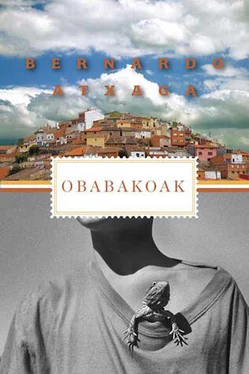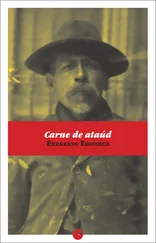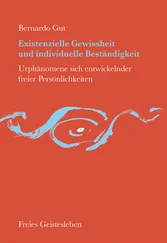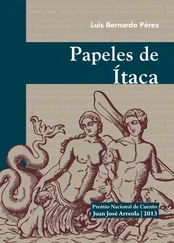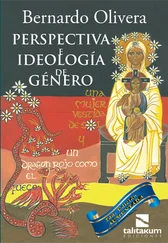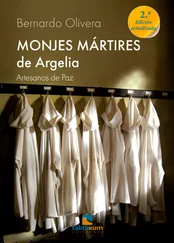Bernardo Atxaga - Obabakoak
Здесь есть возможность читать онлайн «Bernardo Atxaga - Obabakoak» весь текст электронной книги совершенно бесплатно (целиком полную версию без сокращений). В некоторых случаях можно слушать аудио, скачать через торрент в формате fb2 и присутствует краткое содержание. Год выпуска: 2010, Издательство: Graywolf Press, Жанр: Современная проза, на английском языке. Описание произведения, (предисловие) а так же отзывы посетителей доступны на портале библиотеки ЛибКат.
- Название:Obabakoak
- Автор:
- Издательство:Graywolf Press
- Жанр:
- Год:2010
- ISBN:нет данных
- Рейтинг книги:3 / 5. Голосов: 1
-
Избранное:Добавить в избранное
- Отзывы:
-
Ваша оценка:
- 60
- 1
- 2
- 3
- 4
- 5
Obabakoak: краткое содержание, описание и аннотация
Предлагаем к чтению аннотацию, описание, краткое содержание или предисловие (зависит от того, что написал сам автор книги «Obabakoak»). Если вы не нашли необходимую информацию о книге — напишите в комментариях, мы постараемся отыскать её.
Obabakoak
The Observer
Obabakoak — читать онлайн бесплатно полную книгу (весь текст) целиком
Ниже представлен текст книги, разбитый по страницам. Система сохранения места последней прочитанной страницы, позволяет с удобством читать онлайн бесплатно книгу «Obabakoak», без необходимости каждый раз заново искать на чём Вы остановились. Поставьте закладку, и сможете в любой момент перейти на страницу, на которой закончили чтение.
Интервал:
Закладка:
There were some three hundred houses in Vilamediana and almost all had been abandoned fifteen or twenty years before I arrived. Beyond the church, for example, there was an area that seemed more like a cemetery for dead houses than part of the village. You would look in vain for signs of life in its deserted streets and squares. Nothing stirred, no light was lit. There were only shadows, ghosts, silence, and, in the midst of that silence, the dull clamor of the abandoned houses calling: Come in, come in, or whispering: Over here, over here.
People in the village disliked any mention of the place and did their best to forget its existence; they were even ashamed of the dilapidated state of its half-ruined walls and roofs. The few times they spoke of it, they did so with repugnance. There’s nothing but rats and snakes there now, they’d say, it’s a danger to the health of the whole village. It’s no use to anyone. It ought to be pulled down.
That very general way of talking, however, concealed an inaccuracy, or at least so it seemed to me one Sunday afternoon when, after climbing up to the bell tower of the church, I was sitting there reading. For I had the distinct impression that somewhere there was a little boy walking around. Something, some noise probably, made me raise my eyes from my book and look down below me. And there I saw a small figure apparently strolling along a winding road, appearing and disappearing from view as he followed the path traced by the curves. He was walking along, his hands behind his back, with the serenity of one of those wealthy emigrants who returned from South America at the turn of the century. From time to time, he’d sit down on a stone bench and — like me — settle down to read.
Those last two details — especially the habit of walking with his hands behind his back — didn’t particularly strike me and I gave no importance to what I’d seen. I did reflect on the behavior of children, on the taste they often have for solitude, and on how, as in that instance, they’re not in the least bothered by having to walk through a place full of rats and snakes in order to be alone. I felt sure though that he must be a foreign child, for no village child would have dared to come there.
It didn’t take me long to discover my mistake. My supposition was proved wrong when I was witness, again and again, to the same scene I saw that Sunday. On almost every afternoon that I went up to the church to read I’d see the boy strolling through the empty streets. I wondered if he didn’t perhaps live there, if there wasn’t a family still living in the area. I even thought they might be gypsies.
There was only one way to clarify the matter and that was to walk those same streets at night. Just as, when I first arrived in the village, I had gone out in search of the bright lights of the shepherds’ house, so now I would seek out the lights of that family who seemed to have remained there in isolation. One window would tell me if that part of the village was truly dead or not. That same week, one night when I was on my way to the hunters’ bar, I set off instead to find that window.
And there was life there; the quarter wasn’t completely empty. But it wasn’t the kind of life I expected to find. I’d imagined a kitchen, the clatter of plates at supper time, a snatch of conversation. Instead I found only a silent, solitary light in the low window of one of the big houses.
I approached, trying to avoid trampling the nettles that grew around about. I didn’t want the people in the house, when they got up the next day, to realize that someone had been spying on them. But at the time what troubled me most, even more than the rats and the snakes, was the possibility of dogs. What would I do if two or three dogs suddenly appeared? “Steal something as I fled,” I thought in answer to my own question. That at least would lend the episode coherence.
Luckily, nothing broke the silence and I gazed in through the window undisturbed. There was the little figure, bent over a table, intently studying a book by the light of a reading lamp. From the table the eyes of a cat glinted.
“There’s a little boy I’d like to find out more about,” I remarked to Daniel. That was on a Sunday too, and we were out for a walk in the woods, he in the line of duty and I just to take a little exercise. I told him what I’d seen from the church and the explanation I’d come up with, though without mentioning my night visit. He burst out laughing.
“Yes, he certainly is an unusual little boy,” he said. I wanted to know what he found so funny. “Once we’ve checked the woodlands, we’ll go to his house. He does tend to hang around there, along with the rats and the snakes. But I didn’t know he slept there too. I’ll introduce you. Then you’ll see just how unusual he is.” Again he burst out laughing.
As usual we had lunch in the woods and then headed off down toward the village. It was six o’clock in the evening by the time we reached the empty quarter. By day the house seemed smaller to me. It had been a beautiful house once with its portico and wide balcony, rather like the palaces that often end up being made into town halls; and although the upper floor was in ruins, it was the best preserved house in the whole neighborhood. Tied to the grille covering the window I’d found lit on that other night was a bunch of thistles.
When we knocked, we heard the sound of something inside dropping to the floor, then a muffled cry. Finally, when it seemed to us that the silence had gone on much too long, we heard footsteps approaching, and Daniel elbowed me in the ribs to prepare me.
At last, the door was flung open, as if the person opening it were in a rage. I think I must have turned white at that moment, for before me stood a dwarf. From between his legs a Persian cat looked up at us, surprised, as if demanding to know our reason for coming there.
“Yes?” said the little man.
He didn’t even reach my chest but he was no ordinary dwarf. Although small, he was well proportioned, straight-legged, and had no hump. Unlike other dwarfs I’d seen before, he had a small head, small and pretty like a doll’s.
His clothes were not in the least conventional either. Like the rich young masters of yesteryear, he wore gaiters, a waistcoat, and a black jacket with tails that looked like a dress coat.
Daniel wasn’t laughing now. He seemed embarrassed.
“I’d like to introduce a friend of mine,” he began, and, no doubt because he was nervous, he made the introduction more than usually drawn out. He explained that I too was a stranger to the village and, like him, a keen reader, that perhaps we could become friends, that he lived too much alone in that gloomy neighborhood …
The dwarf looked me up and down. His eyes were just like the Persian cat’s, sometimes blue and sometimes gray. Just as I was about to speak, he turned his head and looked angrily at Daniel:
“I live in this gloomy neighborhood because I want to! And what’s more I’d like to be allowed to live here in peace!” I thought that at any moment he would slam the door in our faces. But I was not inclined to let such an occasion slip by me so easily. Here, I said to myself, was the most interesting person I had yet encountered in Villamediana and I had to get to know him. Disregarding the snub he’d just delivered, I held out my hand and told him my name.
I feared he might ignore me, even decline to acknowledge me. But no, he looked me up and down again, then proffered a limp hand, like the hand of a sleeping child.
“Enrique de Tassis,” he said.
“Tassis? Like the count?”
Suddenly I found my opening to the man: Juan de Tassis, Count of Villamediana, poet and friend of Góngora, who was slain for making fun of the king. No one thought of him as being from there, though they did his father. It was said in the village that the group of houses next to the baker’s had been the palace of the first Count of Villamediana. Now, unexpectedly, I found myself before someone bearing the same name.
Читать дальшеИнтервал:
Закладка:
Похожие книги на «Obabakoak»
Представляем Вашему вниманию похожие книги на «Obabakoak» списком для выбора. Мы отобрали схожую по названию и смыслу литературу в надежде предоставить читателям больше вариантов отыскать новые, интересные, ещё непрочитанные произведения.
Обсуждение, отзывы о книге «Obabakoak» и просто собственные мнения читателей. Оставьте ваши комментарии, напишите, что Вы думаете о произведении, его смысле или главных героях. Укажите что конкретно понравилось, а что нет, и почему Вы так считаете.
